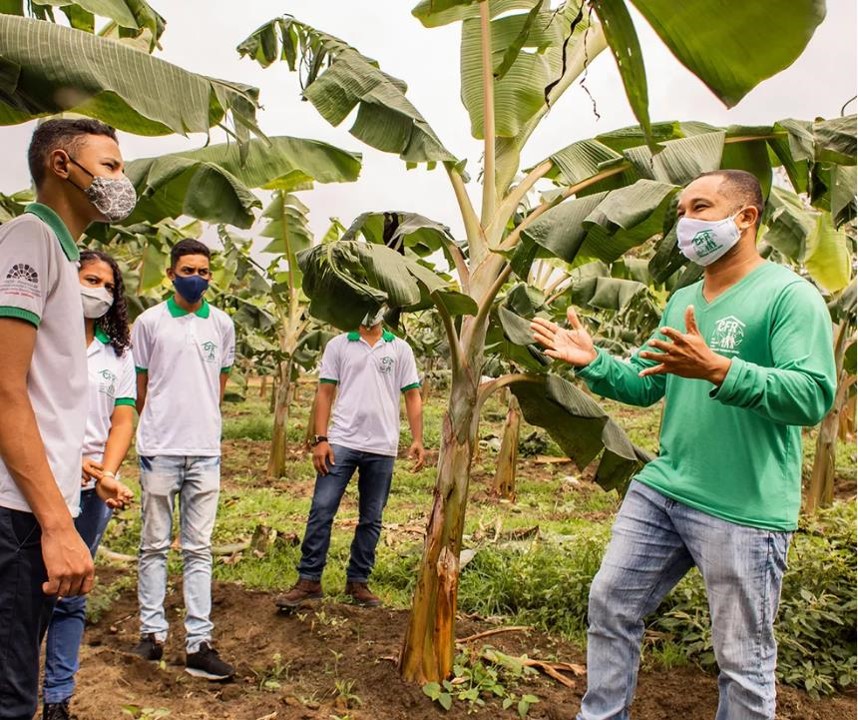The Norberto Odebrecht Foundation took part in the 16th edition of the ABCR Festival, an event promoted by the...
Foundation in the media: see article at Valor
DATE: 07/22/2022
Check out Valor Econômico’s article about the Presidente Tancredo Neves Rural Family House – CFR-PTN program, a partner of the Norberto Odebrecht Foundation, awarded with Prêmio Movimento LED – Luz na Educação (Education Innovation Award) promoted by Globo TV and the Roberto Marinho Foundation.

Program modernizes family agriculture and keeps young people in the field
In the interior of Bahia, the pedagogy of alternation divides the student’s time between regular schooling and practice on the land
By Marleine Cohen – For Valor, from São Paulo – 07/13/2022
Modernizing the rural subsistence activity and containing the population exodus are objectives of one of the winners of the Movimento LED – Luz na Educação award. Awarded in the Technical and/or Professional Education category, the initiative: Training Young Rural Entrepreneurs in Family Agriculture, implemented by Presidente Tancredo Neves Rural Family House -CFR-PTN- in Bahia, is taking place through a free technical program in agriculture and cattle-raising, focused on young people of 15 – 19 years old, who are part of about 70 rural communities in six municipalities of Bahia’s Southern Lowlands.
The three-year training program aims to offer students, children of small rural producers in the region, the basic content required by the Ministry of Education -MEC- for high school and agricultural training with a business approach, focused on developing techniques to improve the quality and productivity of the food they produced on their land. The proposal aims to modernize the subsistence rural activity, stopping exodus and environmental degradation, and to introduce new technologies that can keep young talents in the field, offering them professional perspectives.
Founded in 2002 through an agreement between the city government and the Ministry of Agriculture, Livestock and Supply, and supported by the Odebrecht Foundation, the Rural Family House is located in Novo Horizonte Farm, a 128-hectare property where the Presidente Tancredo Neves Rural Producers Cooperative -Coopatan- also operates, with about 205 members.
The Rural Family House seeks to encourage and modernize family farming, using sustainability parameters from a technical training process integrated to high school through the pedagogy of alternation method, alternating experiences in the classroom and in the field, in tune with the Sustainable Development Goals -SDGs-. This alternation means that those young people can spend one week at school, full time, and two weeks on their land, where they get visits from an agronomist engineer who also acts as a monitor-educator, who will closely monitor their performance and stimulate their families’ involvement in the education process.
Some of the program topics are: horticulture, fruit farming, fish farming, soil studies, property management, and sustainability. According to Thales Lima, the institution’s director, some factors helped consolidate this proposal: the creation of a soil laboratory, which allowed precise geological information to be gathered; the partnership with Cassava/Fruit Farming Embrapa, which incorporated innovative productivity techniques to the students’ training; and the inclusion of CFR-PTN in the Odebrecht Foundation’s Productive Education Project, allowing the supply of inputs to the students’ families.
With this, the methodology was able to develop educational – productive and social-productive projects with the students, by setting up modules of one to three hectares of crops marketed by the local cooperative – cassava, plantain, manioc, and pineapple -, as well as other regional crops: soursop, papaya, poultry farming, and beekeeping.
According to Lima, the initiative awarded by Globo and the Roberto Marinho Foundation has trained, in the last 16 years, 361 students, turning them into rural entrepreneurs, and another 112 are training. There are 223 educational-productive projects in about 216.15 cultivated hectares, besides 211 multiplying actions with 5,643 family farmers, and more than 11 thousand people impacted. In the opinion of the House’s director, the importance of initiatives like this lies in investing in education. “It has a transformative power. Thanks to it, young people manage to change their realities and their communities achieve social and economic development,” says Lima.
The Rural Family House is associated with the Program for Development and Growth Integrated with Sustainability of the Mosaic of Environmental Protection Areas in the Southern Bahia Lowlands -PDCIS-, that aims at the formation of a rural middle class structured in family units and protagonists of their own sustainable development.



No comments